Recent Updates
06/28/2025 12:00 PM
Scouting report: inside VW's new off-road brand
06/28/2025 12:00 PM
How Ellesmere Port was saved: inside the old Astra factory's revival
06/28/2025 12:00 AM
Genesis Electrified G80
06/28/2025 12:00 AM
Lotus mulls PHEV sports cars in commitment to ICE power
06/28/2025 12:00 AM
Goodwood Festival of Speed 2025 preview: all the biggest launches
06/28/2025 12:00 AM
Lotus plans to close UK plant in Norfolk and shift production to US
06/27/2025 12:00 PM
Why the Chrysler Crossfire is not a dog's dinner
06/27/2025 12:00 PM
As ADAS gets smarter, so must the way we test it
06/27/2025 12:00 PM
Mercedes EQS launched '10 years too early', says design chief
06/27/2025 12:00 AM
Inside Renault's radical laboratory on wheels
EV, Hybrid, Hydrogen, Solar & more 21st century mobility!
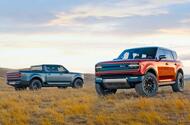
Terra pick-up and Traveler SUV will form the new Scout EV line-upThe Scout name is being revived as a VW Group-backed maker of off-road EVs
It would be easy to dismiss Scout Motors as yet another retro revival, a way of trying to attach some emotion to new electric vehicles by sticking a nostalgic logo on the bonnet.
Or even as just another new Volkswagen Group sub-brand designed to protect the conglomerate’s share in the tough North American market.
Dig beneath the surface, though, and Scout is far more interesting – even if it isn’t a brand too well known to UK readers, and one that, for now, won’t be sold here.
For one thing, what’s not to love about a retro-styled Jeep Wrangler rival? For another, the unusual set-up of Scout could have a significant influence on the future development processes of one of the world’s biggest car firms.
Scout Motors isn’t technically a Volkswagen Group brand: it’s an independent stand-alone company based in the US but owned by the VW Group.
While Scott Keogh, boss of Volkswagen USA, also serves as CEO of Scout, it otherwise has its own staff and facilities. It is, in effect, a start-up created purely to make a new line of highly capable off-road EVs.
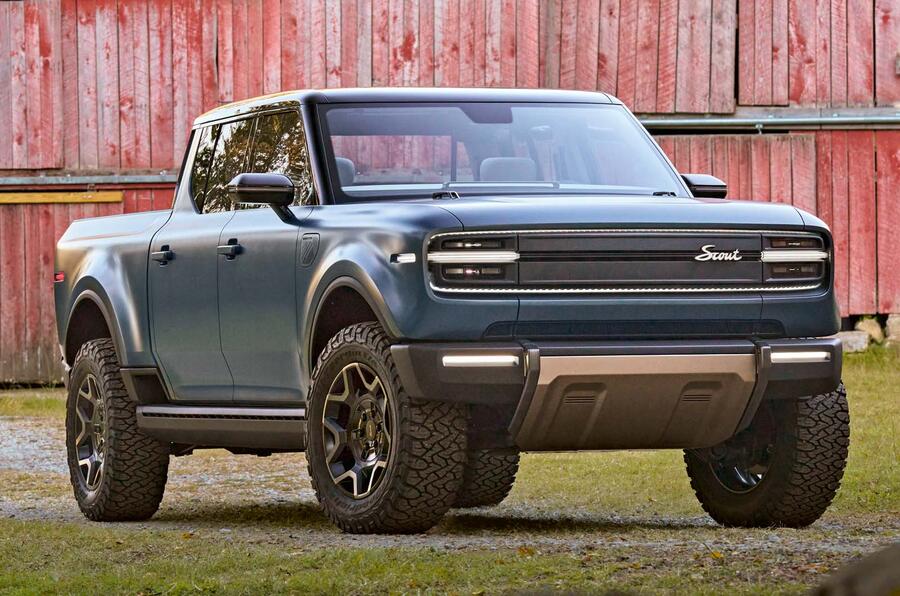
“The intent is to combine an American start-up – speed, innovation, ingenuity, adaptability – with the backing, scale and money of one of the world’s leading manufacturers,†explains Ryan Decker, Scout’s strategy boss (and employee number one). “Nobody has really done that before.â€
But this is an electric vehicle start-up housed in some nostalgic wrapping. A quick history lesson may be in order first because, despite its name, the original International Scout was very much an American machine.
It was developed by International Harvester, a longtime US manufacturer of agricultural and construction vehicles that in the early 1900s expanded into light trucks and pick-ups.
With the Jeep CJ gaining popularity in the 1950s, the Indiana firm decided to develop its own four-wheel-drive recreational vehicle.
The Scout 80 arrived in 1961 and was sold in various forms across two model generations until 1980. Even if the name isn’t that familiar, chances are the model’s styling would offer a familiar ring of Americana.
International Harvester slipped into decline in the 1980s, with its various divisions sold off. The truck and engine division was eventually rebranded as Navistar, and in 2021 it was bought by Traton, the VW Group’s heavy commercial vehicle arm. That also gave VW the rights to the Scout model name.
Here’s where it comes full circle: Volkswagen USA spotted the incredible popularity of the Jeep Wrangler and retro-infused off-roaders such as the revived Ford Bronco, and it wanted a piece of the action.
So in 2022 it decided to create its own start-up to produce one – and it just so happened the company now owned a brand with its own rich heritage.
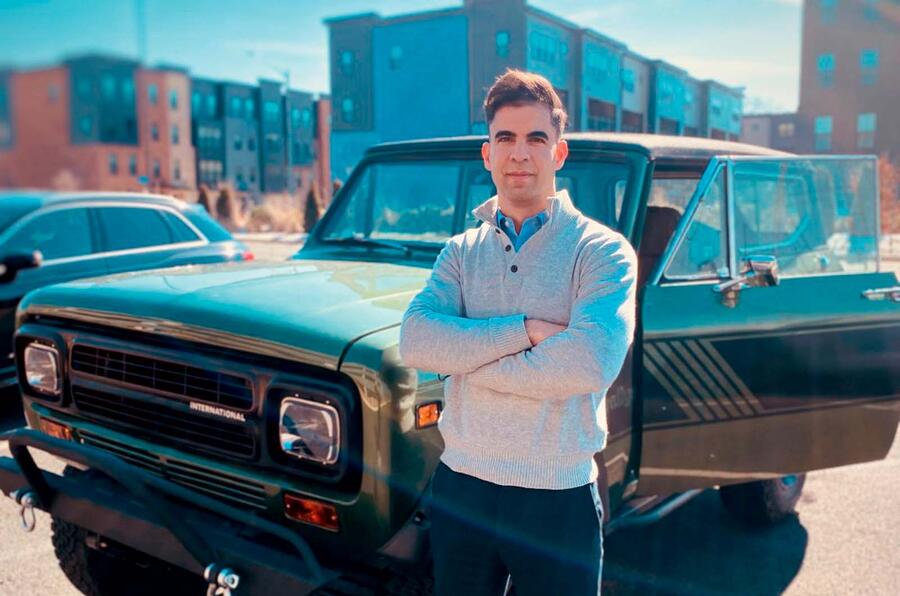
“To be a start-up, but to have the heritage and legacy of a really cool brand that has a passionate fanbase and can evoke nostalgic memories, is really unusual,†says Decker.
And while it’s been 45 years since a Scout last rolled off the production line, he insists the name is still known to US buyers.
“Some guy came up to me earlier today and told me his grandfather had a Scout they used to go on fishing trips in,†continues Decker. “Having that as your starting place to build a brand from, how special is that?â€
Last year Scout revealed two concept models: the Terra pick-up and the Traveler SUV (named after old Scout variants). Few details have yet been divulged, but there’s talk of 1000lb ft and 350 miles of range, rising to 500 miles for the range-extender, and 0-60mph times under 3.5sec.
This is where Scout really diverges from VW Group models: they won’t be built on a shared EV architecture, such as the now well-established MEB.
Instead, if you want to offer genuine off-road ability with the chops to take on a Wrangler on the trails, you will need a ladder-on-frame chassis – and, as Scout technical chief Burkhard Huhnke notes, “there’s no body-on-frame platform in the entire Volkswagen Group – so we have to start from scratchâ€.
Huhnke’s appointment as technical boss encapsulates Scout’s ethos: he has spent much of his career at the Volkswagen Group but was most recently technical chief at the now-defunct EV start-up Fisker. The brief he was given was simple, he says: “The target is to become the benchmark in the off-road segment.â€
To do that, the new Scout vehicles won’t just be styled like the original. “The Scout was a working horse in the past,†says Huhnke. "“It was the eight-days-a-week vehicle that could go off road but you could also do your daily business in. “Off-road capability means it needs to be very different.
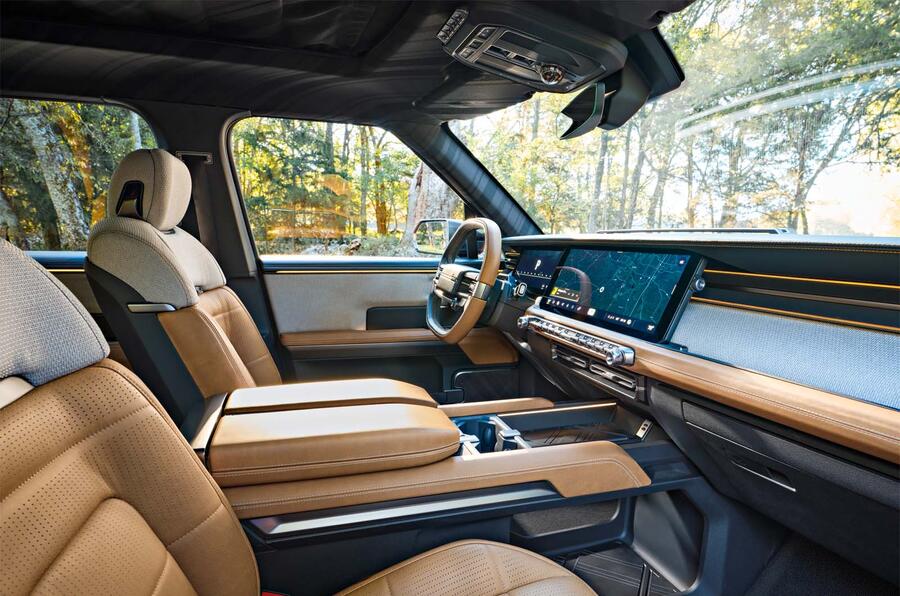
It’s very simple: I get targets from an engineering perspective. We’re focused on ability, on approach angles, the torque, weight distribution, everything. We’re working on an e-beam and a special axle design.
We have 35in wheels. You have to have the sway bar disconnect. But we can combine the tradition of an off-road car with the innovations of an electric vehicle, and we can see a real sweet spot.â€
Scout vehicles will be offered with electric or range-extender powertrains. They will be ‘software-defined vehicles’, designed around advanced computer systems that allow for over-the-air updates and the like. Huhnke describes it as “heritage combined with innovationâ€.
That innovation will be seen in both the pure-electric powertrain and the range-extender variant that Scout is working on. Huhnke is proud that the latter – which drives the wheels with an electric motor but features a small combustion engine used to charge the battery – is the firm’s own development and intellectual property.
He says: “We’re not a guinea pig for the Volkswagen Group to try this out; it’s where we see our biggest opportunity.â€
It’s about that go-anywhere, off-road brief, and providing functionality in remote places where EV charging infrastructure might not be the best.
“We are customer-centric and listen to their concerns,†adds Huhnke. “People loved the concept and the BEV platform, but the feedback led us to a range-extender. It’s like carrying a charging station with you.â€
Huhnke is also excited by the potential that an electric vehicle powertrain, with its instant power, torque vectoring and even weight distribution, has for an off-roader.
Software development will also be key, and it’s notable Huhnke started his automotive career in software and electronics. For that side, the VW Group’s recent tie-up with software-focused EV firm Rivian will be a major boost.
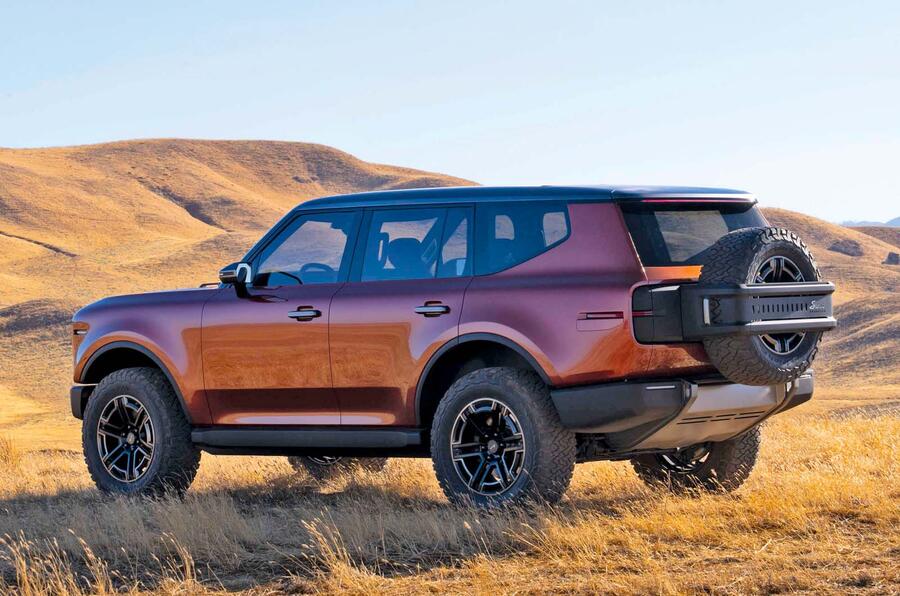
The joint venture between the two companies is centred on the development of a new zonal software architecture, and Huhnke says that “Scout will be one of the first brands†in the VW Group empire to use it: “It will be the most modern architecture, so we’ll have full connectivity to the cloud for diagnostics, predictive maintenance and new functions to keep the car fresh.â€
While Scout has shown concepts of its first two models, production versions are unlikely to appear until 2027 or 2028. Before then, the firm needs to finish development, while construction is also under way on a dedicated US factory in Georgia.
Needless to say, not many automotive start-ups can invest in a vast $2 billion (£1.6bn) facility that could employ around 4000 people and produce 200,000 vehicles a year.
Aside from the need to finish building that factory, it’s a rapid cycle for a new start-up to launch products in, especially given the huge technical demands on off-roaders. “Being a start-up means we can focus,†says Huhnke, “and we are laser-focused on two products.
“I don’t want to judge traditional car manufacturers, but we can focus on our first bullets without distraction. And by using digital technology and digital twins [testing simulated versions of cars], we can speed up the process.â€
Conversely, unlike some start-ups with a limited pool of investment, Scout has the luxury of time. Huhnke adds: “Sometimes you can see start-ups that have to push the product because of cash flow, but we can take time to get it right before it goes to the customer. We can do full-speed development and testing now and really work on the architecture and ability.â€
Scout won’t just work on the models for the next few years, though: there’s also a brand to build. Decker describes that process as “building a communityâ€, adding: “We want to nurture existing Scout fans out there. But we want to make new fans as well.â€
While he won’t be drawn on reservations to date, Decker says the firm is “happy with where we are†– with the Traveler SUV making up the bulk of buyer interest. He says the focus is on ensuring an ongoing dialogue with the people who have signed up, adding: “We won’t treat them like a marketing database.â€
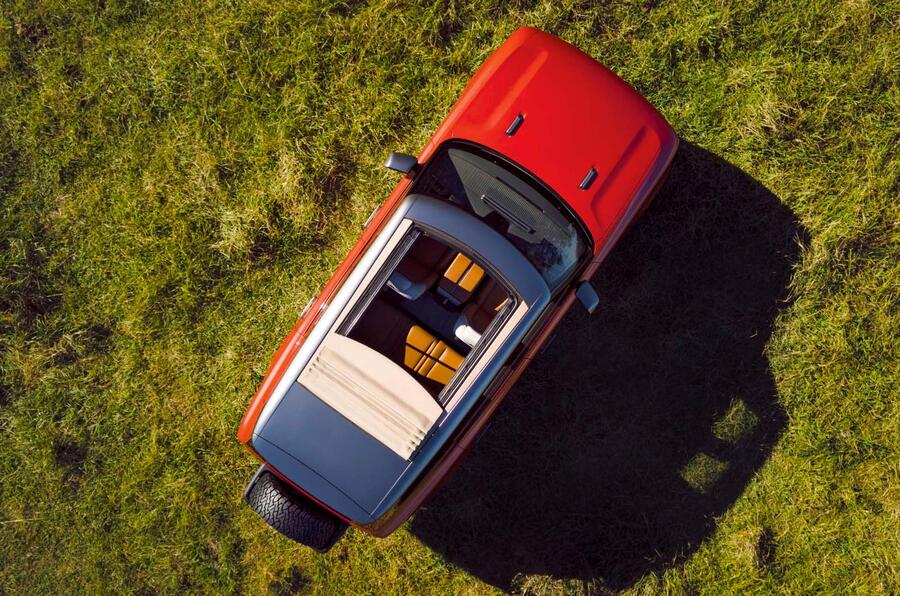
Similarly, Decker won’t give specifics about any sales or growth ambitions for Scout, but he notes “the two products we’ll launch will cover more than 40% of the US market in terms of revenue and profit poolsâ€.
Pricing is expected to start from around $50,000 (£40,000). But beyond a new Jeep rival for the US market, what about that bigger picture?
While both Huhnke and Decker insist Scout was conceived purely to fill a business opportunity, its unique set-up and technology could provide lessons and hardware for its Volkswagen parent.
“You never get money for free,†laughs Huhnke. “Efficiency is key. I’ve taken the challenge to become a benchmark R&D organisation in the world, from a size and cost perspective. That is an interesting challenge appreciated by our sponsors as well. Of course, we are under observation.â€
There are already reports that both Volkswagen and Audi are interested in Scout’s platform for their own off-roaders, along with hints that the new Scout factory could be used to produce models for other brands while the marque is ramped up.
It’s certainly an intriguing prospect, and Scout is worth watching because of how unusual it is as a start-up backed by a global car giant.
“You have a bunch of incumbent firms that are 100-plus years old with millions of loyal customers, but they also have a lot of complexity with lots of cars, powertrains and factories,†says Decker.
“Complexity is a challenge to growing a business. On the other hand, you have pure-play start-ups, who can react quicker, but they bring lots of questions.
"Will they have success? Will they go bankrupt? Can they service your car?
“If you can take the scale offered by an incumbent and mix it with the enthusiasm of a start-up, think what a superpower that is.â€Â
